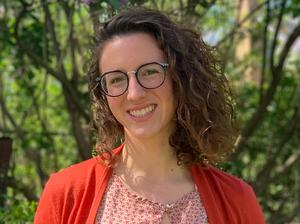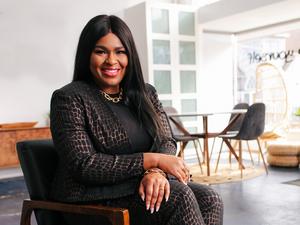
Editor’s note: Welcome to The Pitch, a DC Inno special feature in which we spotlight young local startups led by underrepresented founders. These companies may not have much (or any) funding or revenue, but they do have plans — and they’re taking the initial steps to make things happen. Each month, we’ll highlight a different venture in the D.C.-area landscape, with an intention of following their journeys from this point forward. Previously we have featured CarpeDM, Old Dominion Flower Co., Acclinate, OneVillage and Isotonik Solutions.
Lauren Choi was a materials engineering student at Johns Hopkins University in 2018 when she learned that the U.S. lacks the infrastructure to recycle most of its plastic.
That problem “inspired a great sense of urgency," Choi said, so she set out to build a machine in her garage that could turn plastic — like the Solo cups so ubiquitous at college parties — into something less disposable: clothing. That first machine spun those cups into filament, and Choi weaved them into fabric samples that could eventually be made into dresses, shirts and tote bags.
Today, Choi runs the New Norm, a sustainable materials company that turns typically unrecyclable plastics — from cups to old fishing nets — into yarns and fabrics. Its clients are clothing manufacturers, and it is currently working with with Georgetown’s Halcyon Incubator, a residency fellowship for social enterprises, to help scale its technology.
“We are living in a time where drastic, innovative measures must be taken to reverse the damage we have done to our earth,” Choi said. “This is a pivotal time in history at which humans have the power to make impactful change.”
And though still in its early days, her startup “is a promise to better our environment and pursue sustainability through tangible implementation,” she said.
The pitch: The now 3-year-old D.C. company helps businesses identify recyclable plastics and achieve corporate sustainability goals, and then licenses its materials to materials to manufacturers so that they “can easily integrate our products into their existing supply chain,” she said.
The team: Choi, the founder and CEO, is the New Norm’s sole employee. She’s not hiring at this point, she said, but expects to add employees in the future.
The mission: One of the New Norm’s chief aims is to remove plastic waste from communities, particularly in underdeveloped nations that have no formal waste management infrastructure. The company is teaming with organizations that run collection programs in Southeast Asia — critical work, Choi said, because overflowing landfills disproportionately affect vulnerable populations by contaminating waterways and food.
The business model: The New Norm has two revenue streams: selling yarns and fabrics to apparel companies, with pricing based on volume; and licensing its fiber blend formulations to yarn manufacturers and brands. Its initial target market comprises small, higher-end apparel companies and designers that, so far, have created tote bags, dresses and tops with its fabrics. They’re “willing to incorporate premium, sustainable fabrics into their collections,” according to Choi, and their customers have “expressed a willingness to pay more for a product if it is eco-friendly.”
The challenge: Following more than two years of lab testing and formal product development, Choi’s company is still working with U.S. yarn and fabrics manufacturers to scale and refine its production processes. Funding is a challenge as well. Choi has raised $100,000 to date is continuing to apply for grants that would fund product development and commercialization trials.
The game plan: The New Norm intends to move deeper into material licensing because it represents the “fastest path to scale,” Choi said. The next step, she said, is to find a brand that’s willing to adopt the company’s technology and increase capacity. Sustainable materials are in just a small fraction of products on the market, but that's expected to change as companies look to play a more important role in eliminating waste. “If major downstream markets — apparel, automotive and home furnishing — intend to transition to sustainable materials in the coming decades, we must establish ourselves now to begin tackling such a significant volume," Choi said. "We believe that by acting fast and achieving large-scale adoption, we can be an early player in this sustainable revolution.”




